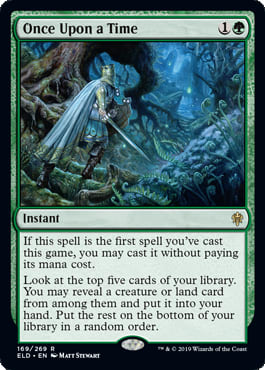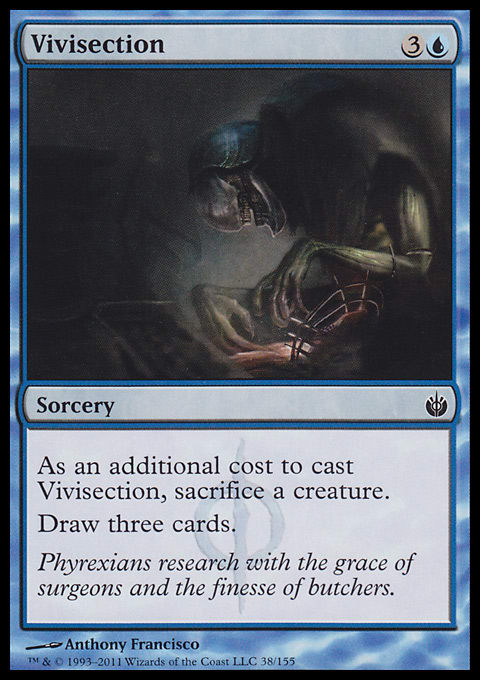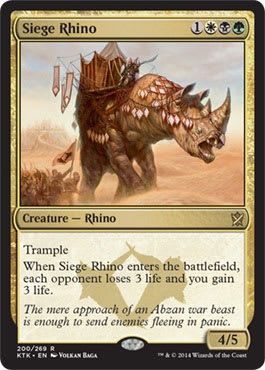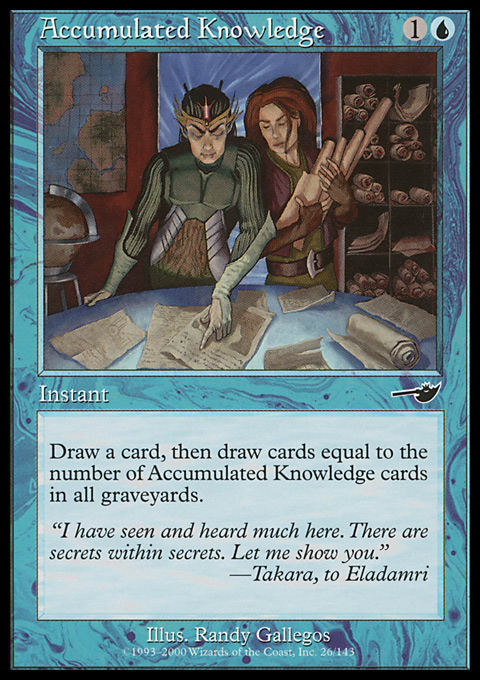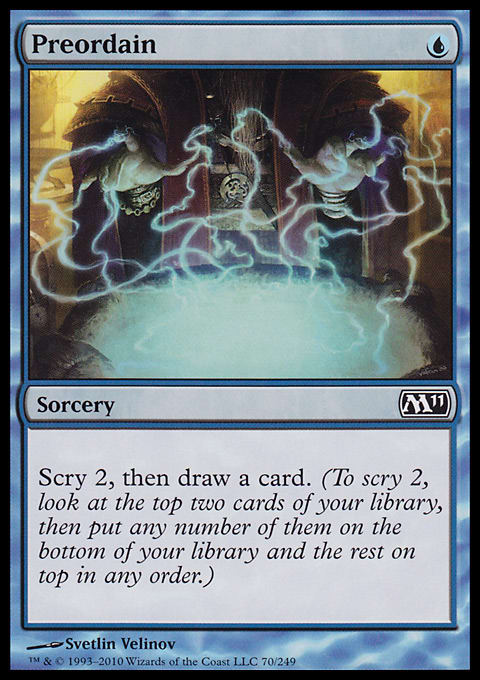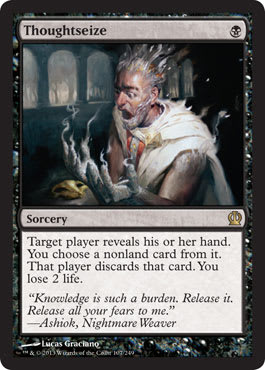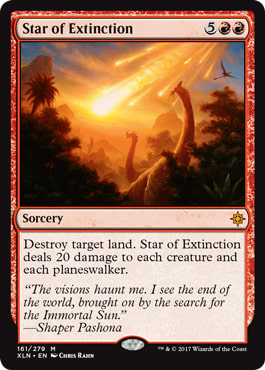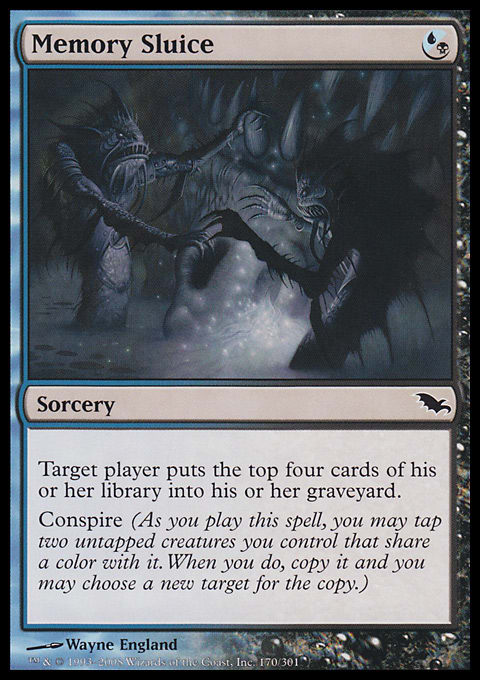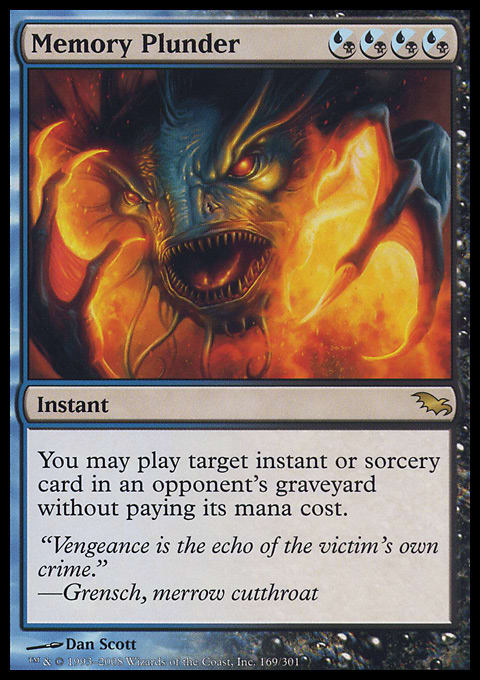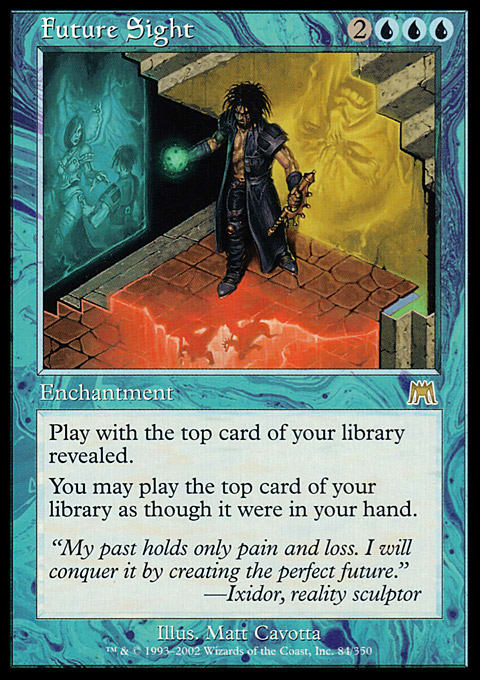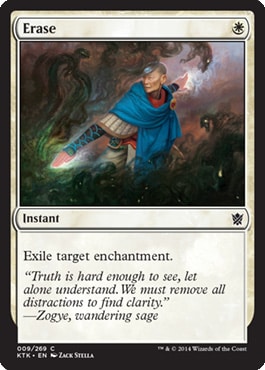The blood had been scrubbed by two different women, but the side of the stalag with the hair and head splatter still stayed the same shade of raw red. Heir Rauff grabbed the squirming girl by the elbow and made a joke about proper training, throwing her down into the crunchy cold snow.
Quick! If you had to recite the entirety of the last Magic game you played - game states, sideboarding decisions if applicable, every card you drew, every play your opponent(s) made - what percentage of it could you get it even remotely correct? How true would this be if a game had only ended a few minutes ago as opposed to several hours or days?
I used to think players who told revisionist luck-based stories after they lost Magic games were just doing the dance of self-serving - and of course, many are - but now I'm starting to think it might just be that their memories are victims of a handful of unfortunate and involuntary processes in the brain.
And truth be told, that original belief is on me. I was projecting because of how well I used to be able to remember things. There are phone numbers from my childhood friends etched into my mind forever, but these days, I have trouble forming new memories all the time.
And Magic games? Please. I've never been a major fan of being able to write down revealed cards from opponents, but since chemotherapy, I'm pretty lucky that rule is around.
A player aspiring to be the best possible Magic player they can be - really anyone wanting to conquer any strategy game - should work on their memory palace technique. Yes, it's that thing Holmes does sometimes in the Sherlock television series, and yes, people really do use it. There are competitions for memory all over the world, and often, older participants do as well as their young counterparts.
It can be done.
The girl's bucket of suds treachled down the gravel toward the woods and fence while she lay colder than the snow bank, a doll-eyed doe, another round of meat destined for the char.
So maybe that's it? Maybe players just don't remember the games accurately enough to know for sure one way or another? Perhaps it's just a common case of Favoritism Intuition?
See, chemotherapy can break through the blood-brain barrier and mess with cognition, memory - the whole ugly factory is at risk. Everyone is a little different, so there's no predicting everything it can do. The important factor is that there's enough knowledge in the medical sphere to fight cancer at all, I suppose.
Not that that's the worst part or anything.
Rauff tells me he's up for Befehlsleiter and that he is tired of the weather. He puts a cigarette in his dry, cracked lips. He hands me papers. I leaf through them. Names. Every page, top to bottom. All names.
In short, there's a loss of information between the Magic game happening and what players remember as time progresses afterward. And that's a real issue because, as it's been emphasized a thousand different ways by now, you can't fix your game if you're convinced there's nothing broken about it. It'd be like trying to pull a tumor out of some kid's neck without using imaging technology first. Or doing it with a spoon while blindfolded, or some other flavor of lunatic.
After I finished all the treatment - surgery, radiation, chemo, all of it - a friend asked me the worst part about thinking you might die and having a lot of time to sit with it, as opposed to people who leave the world more suddenly. I told him that the best story I know could die with me; I could die before I've written it down, and if I'm the only person that knows? That means it's gone. Permanently. That loss of information is not recoverable.
This beautiful, horrible circumstance, these compelling real life people that really went through something, that still go through something to this day, whatever the world could learn from their terror and anguish would be so much less valuable.
He asked why that was important to me, being in the position I was in at that point.
I explained that it's really good knowledge, and without all the great knowledge that humans had assembled to that point, all the collected stories and data we'd synthesized into technology and solutions, I would've been dead already.
It's not any different in Magic, is it? Let's say your opponent plays Siege Rhino, and if you don't deal with it, you're going to die. I trust that this is within our imagination. If you have the right knowledge, you may be better prepared to survive the Siege Rhino. If you do not have the right knowledge, your odds of success are going to be much less. And don't forget: A lot of this starts before you're even at the tournament hall. And of course, it takes a collected sum of reliable data to get the best solution.
This is how the world improves. This is how human lives get better.
"I'll be sending you these each week," he said, pointing to the papers in my hand, blowing around in the winter wind. "Round them up the morning after it arrives. A truck will come to get them." I asked where they were going next. He told me Auschwitz.
Imagine what Google would be without this universality.
And yes, it really is universal: The better our knowledge, the more power we have over the future. It means we can make decisions about how to safely travel in airplanes and how to see cancer in order to treat it before it kills its host. It's the only thing that allows human beings to be what we are at all.
What are humans anyway?
Humans are creative agents of ideas, as well as survivalists via the cognitive ability to make accurate predictions. We don't rely on just instinct to keep us alive; we can imagine what would happen if we were hit by a car or if we swam in a thunderstorm so that we don't have to die to learn these things. Most other organisms do not have these kinds of discerning and powerful information uses.
If you have sufficient knowledge about what will happen in various game states against Siege Rhinos, you have more predictive power over them.
If you want to apply this to tournament Magic more generally, here's what you need: You need to have a good understanding of what happens before the most important game states in a format, as well as an accurate recollection of how the reality of your tournament experience confirms or refutes the data you built your strategy around going in.
Is anyone capable of doing this to the point of mastery? Hell no.
That's why you should get started.
Alone at dusk, I lay and count the dust bunnies on the floor. Two, four, twenty. These nights, even at twilight, it still stinks of copper, blood, and burning so bad that I can't eat. Twenty-five dust bunnies, twenty-six, twenty-seven...
So we've established the importance of strong data and information because it informs knowledge, which is what solves the problems that prevent our marvelous infinite progress and the predictive powers that give us success at our endeavors, and we've also established that using this framework will make a dedicated mage reading this very good at Magic cards one of these days.
Deep junk, right there.
Put simply: Does being able to Google anything and everything at any time using a quantum mechanical computer that lives in your pocket improve your life? Me too. Weird.
Being that we've also established that it's got a lot of universality, how can we also use this framework on smaller scales? And what else does this mean for one's ability to have an advantage in Magic?
I awoke and forgot my dreams. The second knock happened, and I realized the first had brought me up off my pillow. I opened the door, letting the cold in.
I know nobody comes here for molten political takes, but it's extremely related to all this memory and knowledge theory, so deal: I'm not enthralled with the idea of state leaders that send cronies to bury their school records. So I'll go public with thinking that's "a pretty bad thing."
What's the line about history repeating itself? Those who don't listen are doomed to repeat it or whatever?
Don't ignore data. Don't erase knowledge.
Because that is what it leads to.
It reminds me of the insanity quote: doing the same thing over and over again.
There are a lot of things people really shouldn't ever want to have to learn a second time.
A young woman stood before me, shaking, starving. A Krakow jew, probably, here from yesterday's train. Delusional, maybe hypothermic. But more than that, she looks...human.
One of the largest Magic knowledge databases disappeared a few weeks ago, and that really sucks. A friend who bookmarked one of my in-the-present cancer pieces from back when that was freshly awful asked me where it had gone.
Mercifully, friends saved a lot of my lost material, especially the bits I really treasure, but it was fairly difficult. I don't imagine that's an option for most writers affected, but that's really unfortunate for all the reasons related to the framework we're discussing. I sincerely hope fifteen-plus years of material is able to be restored at some juncture so that Magic doesn't have to start over in more places than necessary. The world moves fast, and the game doesn't need any extra slowdowns.
She was collapsed in the road the next morning, unaware she was at an impatient gunpoint. "No," I cried to the officer. "She is one of mine." He insisted she is unsuited for work. "There is more than outdoor work," I told him.
So what determines when knowledge gets erased or eradicated?
Easy.
It's up to whoever has the most power.
I started my announcement of that week's names: "Natan, Bernard." "Berg, Else." "Gerson, Dora."
It's called "The Hierarchy Rule." It says that whatever the biggest, most powerful entity is gets to decide what stays and what gets erased.
Your opponent casts Thoughtseize targeting you. Your opponent has gained a sort of "knowledge tempo" advantage because you have to reveal your hand and they don't, and because your opponent has the decision power to get rid of a card and you have no say in it (assuming you aren't playing only lands in your deck to ensure you're able to head fake Thoughtseize with 100% reliability, and if that's the case...good job?), they decide which information is removed from the system.
By the second week in my employ, she knew where all my belongings were best suited. By the third week, there were no dust bunnies left to count.
There's a reason people play Thoughtseize all the damn time.
On a more large scale example of The Hierarchy Rule: think of Earth and the Sun. The smaller object (Earth) is entirely privy to the much larger Sun, while the Sun just sort of sits there.
Sticking with space themes, which is more powerful according to The Hierarchy Rule: a.) Human beings or b.) A large asteroid coming toward the Earth?
"Selz, Otto." "Perl, Gisella." "Taube, Carlo."
The answer is that it depends. If human beings have enough knowledge, they can be more powerful than the much "larger" body that would otherwise eradicate them, erasing all human knowledge and information practically forever.
Here's hoping NASA's data systems are sturdy. And I'm not just talking about their hard drives.
By the fourth week, I loved her.
So what has the power in our brain in terms of what it remembers and what it doesn't about games of Magic or anything else? What determines which factors in a game get remembered?
Man, I don't know!
The only thing I'm willing to acknowledge as somewhat factual in relationship to this question is the tendency for traumatic, really terrible things to stick with us. It seems like a really cruel joke, but that's part of the long-term data collection existence itself is doing, I suppose. Maybe if we last long enough as a species our ancestors will place less emphasis on frightful things to think about and contemplate. Maybe they'll be less afraid than we are.
It's all one big format to solve. It's up to us to keep it healthy.
The new papers arrived last night. Her name is on page four, seventh from the bottom. I sat for hours staring at it. Then I looked at all the names around it, contemplating the forlorn admirers that will mourn them. Names. Pages of names. I stared at them, and they stared back.
Of course memory as it would benefit you in Magic isn't just about recollection; it's about recollection while actively under time constraints. Slow play is real, and you can't just sit there. In paper Magic there's been a healthy increase in the encouragement of practical but proactive, sporting slow play calls. Digital Magic will presumably always operate with some kind of mechanism to make slow play a moot point.
So we're talking about processing power - which you probably don't have a lot of control over - and your ability to organize and practice using good data in the moment - which you have plenty of control over.
Preparing for a tournament shouldn't be all that different than practicing a musical instrument. In the same way your motor memory can expedite the process your body needs to go through for you to coordinate your hands (and mouth, where applicable) in order to make the right sounds with a piece of hardware, your brain can go much faster on the fly if the problems in Magic games it is trying to solve are problems it has already been conditioned to navigate.
You can't know everything you're going to face, but here's the good news for you: Not that many players really try that hard on these edges. You could get a ton of percentage points, here.
"I lost the correspondence. I am sorry. Do you have a copy?" The truck that day left with no one, but I was assured the names would be delivered again, and this time, they were not to be misplaced. I humbly agreed, but I also made a small request.
And hell, I couldn't get those edges if I wanted to anymore! Like I said, my memory isn't as incredible these days, and the contrast is certainly steeper than it would be with just aging like a normie. In a situation where I have to remember a small number for more than several seconds now, I use my fingers to "bookmark" it. I walk around holding up fingers like a lad learning math.
People need the extra percentage points against someone as good as I am anyway, right?
"If you wouldn't mind, sir, please have these documents brought to me with the script written in pencil. The ink is often smeared, and the Jewish names are very difficult to determine."
If you're preparing for a tournament, treat your mind like a Magic game state wiki. Then fill that bastard out.
Here are some other things to avoid if you're a tournament tryhard trying to make something happen:
I always thought the "get a good night's sleep!" advice was as lame for Magic events as it was for state testing in high school. These days, I'm reading a book that is educating me on how insanely vital it is for us to cooperate with our bodies when it comes to rest. Your mind needs sleep to process all the stimuli you get in a day. The less it's allowed to do that, the more you're going to forget things you shouldn't in the middle of Magic games.
Six days a week, she tended my quarters. One day a week, I destroyed another life so that hers could remain.
Next thing: Your brain has a ton of space, but it is technically finite. So you don't want to tie it up with more "programs" than it needs when you want it to be narrowed in on winning Magic games and remembering stuff that contributes to that happening as often as possible. Life comes at people in all kinds of unpredictable directions. Just mitigate how much you let all that set up shop in your power plant.
I took away countless innocent lives from the world, lost forever, so that she may end the war that I now know will haunt me all of my days. God forgive me.
Good Knowledge Should Be Saved, Preserved, Loved
Summary:
- Good information and data leads to the creation of new knowledge, which benefits humans and results in countless progressions for our lives.
- In the same way, knowledge about Magic allows us to understand and progress the game, as well as our own competitive abilities within it.
- A loss of knowledge requires that knowledge be re-established. In the worst scenarios, this results revisiting very painful mistakes.
- Having a maximum amount of knowledge about an anticipated tournament environment grants players predictive power. Players with greater predictive power about game states and solutions in those game states are much more likely to succeed.
- Determining what knowledge and information survive and prevail in greater awareness is largely a question of power. This obeys The Hierarchy Rule, which says that larger objects influence smaller objects far more than vice versa.
- Magic players largely have poor memories regarding their post-game data and the "stories" they tell themselves about their game experience after the fact. This results in an abundance of bad data and faulty intuitions.
- Having a more accurate review of Magic games after the fact will allow for much better data, which will in turn, improve data for predictive power going forward.
- Beyond using technology to record games, for practical purposes, memory is largely the most relied upon resource for most Magic games and the data embedded in them. Your memory for these purposes comes down to whatever innate biological processing power you have, as well as how much repetition you have for the same or similar game states and what external factors you allow yourself to mitigate, including sleep and stress.
- People are agents of information, which means, terribly, whenever someone is gone, the only data that is preserved are the works and memories that they have put into the world. Knowledge is precious, and it should not be erased haphazardly.
(~_^)
"The Rascal"
The "Indestructible" Danny West
Her memory is departing, and I am grateful. Though I hope mine is soon to follow, I understand the punishment of its preservation. It is not something I fight. It is a battle in which I have long since surrendered.
Many nights, I've laid by her side counting the dust bunnies on the bedroom floor, wondering what it will feel like to become dust at long last. Some nights I barely blink, as I'm consumed with the notion that life itself is a demon that found its prey in me, and that when I die I'll at last elude it for the first time.
And yet it's so difficult to think I could have done otherwise. Even in the long warmth of my life with her, in the clear twilight air of our final act together - here, now - I am always at the mercy of an audience that doesn't clap or cheer. When I see out into the dark audience judging me, the black jury, I see no faces.
Names. Only names.
Familiar names she can never be allowed to remember.

















